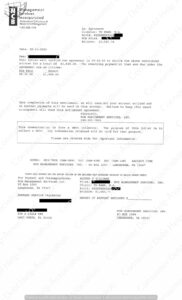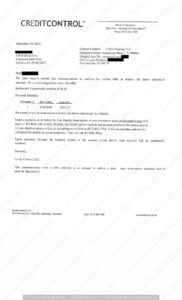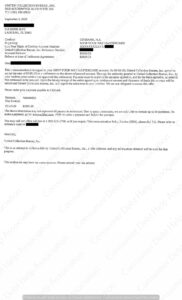Consumer Debt Help Association, Debt Relief Specialist wants to share a settlement letter from Nordstrom/TD Bank. Bal. $12,184.10 Offer $5727.00 Savings $6457.10

Consumer Debt Help Association, Debt Relief Specialist wants to share a settlement letter from Nordstrom/TD Bank. Bal. $12,184.10 Offer $5727.00 Savings $6457.10

Click the link below to view the full article !
Consumer Debt Help Association, Debt Relief Specialist wants to share a settlement letter from TD Bank. Bal. $3645.74 Offer $1458.29 Savings $2187.45

Consumer Debt Help Association, Debt Relief Specialist wants to share a settlement letter from TJ Maxx/Synchrony Bank. Bal. $1589.26 Offer $556.25 Savings $1033.01

Consumer Debt Help Association, Debt Relief Specialist wants to share a settlement letter from Shop Your Way/Citibank (Old Sears) Bal. $5659.53 Offer $1981.00 Savings $3678.53

Credit industry persuaded Congress it would protect people who miss payments due to virus; consumer groups push back
Missed or late payments on car loans and other borrowing will be recorded during the coronavirus outbreak, but the credit-reporting industry will give them a special code.
WASHINGTON—The financial industry persuaded Congress to reject a moratorium on recording missed and late payments on credit reports during the coronavirus outbreak, raising concerns that people who lose their jobs will take a lasting hit to their credit scores.
Legislation that would have prevented credit bureaus from reporting negative credit information for four months was shelved in the lobbying frenzy ahead of last week’s passage of the roughly $2 Trillion economic stimulus bill, lawmakers said.
The credit industry argued that it already has adequate measures to protect people’s credit during disasters, and that incomplete reporting would lead to lasting problems in determining people’s creditworthiness.
Democratic Sens. Sherrod Brown of Ohio and Brian Schatz of Hawaii have pledged to keep pressing for their moratorium proposal. The National Consumer Law Center said trusting creditors to help consumers “is just not acceptable.”
“While our bill didn’t make it into the final package, this issue isn’t going away,” Mr. Brown wrote on Twitter last week. “I’ll keep fighting with @brianschatz to make sure families don’t take an unfair hit to their credit during this crisis.”
A person’s three-digit credit score is based on payment history, amount of outstanding debt, length of credit history and new accounts. Payment history includes things such as mortgages, auto loans and credit card payments.
Creditors say they will use a natural-disaster code during the pandemic for missed or late payments, which they will flag to future lenders that the borrower isn’t at fault and won’t harm credit scores.
“Reporting negative information with a code doesn’t work because that negative information is still in the system,” said Ed Mierzwinski, who oversees the federal consumer program for U.S. PIRG, a consumer advocacy group. “We are bracing for a flood of late and missed payments because of the crisis. The only way to truly help people is to shut off the spigot of negative information from the credit bureaus.”
Messrs. Brown and Schatz introduced their negative credit reporting moratorium proposal on March 18. Three days later, the U.S. Chamber of Commerce and associations representing banking, financial services companies and credit unions delivered a letter to Senate and House leadership assuring them that they don’t need to step in.
“As you consider options to protect consumers from harm, please be aware that blanket suppression of all adverse information in credit reports could disrupt consumer access to credit in the future,” the letter says.
When it came time to finalize the stimulus package last week the strict proposal was gone, replaced by a provision drafted by Republican Sen. Mike Crapo of Idaho, chairman of the Senate Banking Committee, that leaves it up to creditors to help consumers through pandemic-induced economic hardship. Mr. Crapo’s office didn’t respond to a request for comment.
“Where is the political willpower to protect consumers?” asked Chi Chi Wu, a staff attorney with the National Consumer Law Center. “This is one of the few things that the federal government can do to truly help people that doesn’t cost the federal government any money.”
The credit-reporting industry says its three main companies will abide by reporting restrictions Congress puts in place, but argues that limiting negative information will only make it harder for lenders to decide which borrowers to approve for loans and mortgages.
The push to suppress negative credit information comes after a series of reforms that limited the information on credit reports to protect consumer privacy, said Francis Creighton, chief executive of the Consumer Data Industry Association, which represents credit bureaus.
Credit reports no longer include certain negative information like most tax liens and judgments, meaning lenders don’t see that information when reviewing loan applicants’ likelihood of repaying their debts. Lenders can access these records in other ways.
“The lender needs to understand what a person’s ability to repay is,” Mr. Creighton said. “Taking information away from them is going to make that problem worse for consumers” through more reluctance to issue credit or through higher interest rates on loans or credit lines.
Mr. Creighton’s group is urging people affected by the economic slowdown to contact creditors directly to seek delayed payment agreements or forgiveness of some debts, under existing protocols for disasters and financial crises.
Consumer advocates said that while some creditors might work to help people, the absence of a congressional mandate to do so means that others won’t.
They listed potential problems such as larger companies not having enough customer service and training capacity to handle the deluge of concerned borrowers while smaller lenders—whose clients tend to be among the most financially vulnerable—could fail to code troubled accounts for the natural disaster.
copyright 2025 Consumer Debt Help Association - 516 N. Dixie Highway, Lantana, FL 33462. All Rights Reserved